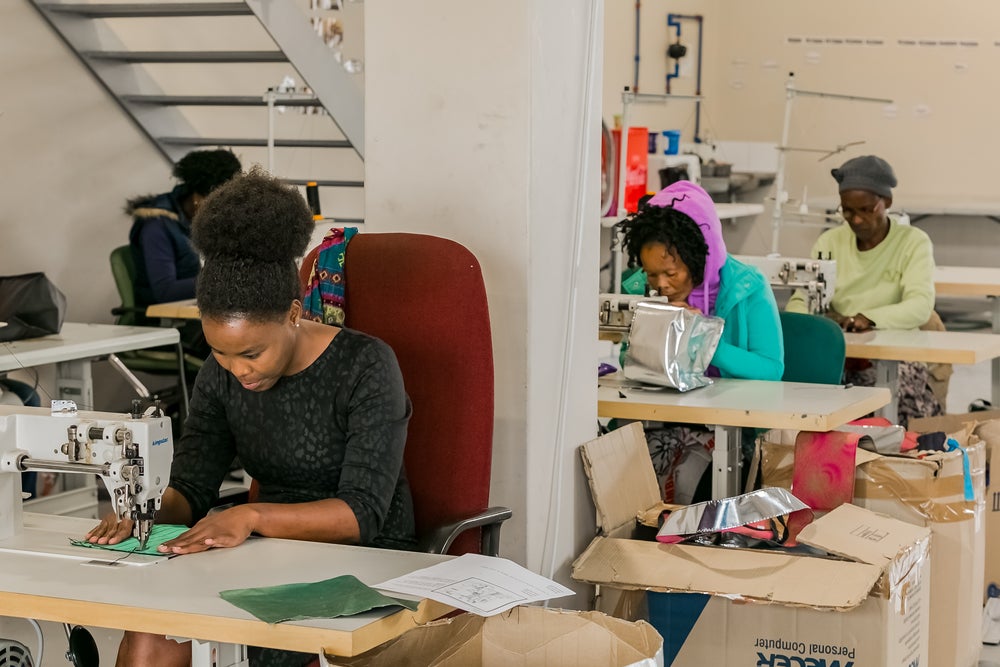
A part of an initiative that runs till March, a sequence of inspections had been carried out in December final 12 months in textile and garment factories situated in Mandeni, KwaZulu Natal Province, roughly 80 km from Durban, South Africa.
The checkups allegedly uncovered a spread of violations together with excessively lengthy 12-hour shifts, rampant occupational well being and security breaches, rest room break restrictions and unsanitary circumstances.
Some factories had been discovered to be utilizing unlabelled chemical compounds with out correct private protecting tools, and in some cases, these chemical compounds had been positioned in entrance of fireside tools. Blocked hearth escapes had been additionally recognized, posing severe hazards in case of emergencies.
The inspections had been stated by the Division to be in adherence to requirements set by the Worldwide Labor Group (ILO) to make sure compliance on labour issues regarding working circumstances, minimal wages, labour relations and occupational well being and security.
Division of Employment and Labour chief director of provincial operations Edward Khambula stated the clothes and textile sector was struggling to satisfy requirements of compliance with labour laws.
Khambula stated there’s a collective settlement regulating the sector within the space of Mandeni, nonetheless, “when you fail to pay the Nationwide Minimal Wage we intervene.”
Entry essentially the most complete Firm Profiles
in the marketplace, powered by GlobalData. Save hours of analysis. Acquire aggressive edge.

Firm Profile – free
pattern
Your obtain e-mail will arrive shortly
We’re assured concerning the
distinctive
high quality of our Firm Profiles. Nonetheless, we wish you to take advantage of
helpful
resolution for your small business, so we provide a free pattern you can obtain by
submitting the beneath kind
By GlobalData
Manufacturing facility wages had been discovered to be considerably beneath the trade’s agreed-upon minimal requirements set for garment and textile industries by the Nationwide Bargaining Council for the Clothes Manufacturing Business, with some employers paying as little as R10 per hour (US$0.53).
The charges within the collective bargaining settlement had been above the nationwide minimal wage which is R25.42 per hour (US$1.40).
The Division’s chief inspector Milly Ruiters stated the Division appeared to “depart no stone unturned.”
On the time of the blitz inspections, a number of employers tried to “dupe” inspectors with excuses similar to claiming they weren’t knowledgeable concerning the visits in an try and tinker with their information and a few even tried to help their staff in eloping from the premises.
The Southern African Textile and Employees’ Union (SACTWU), an affiliate of the worldwide union IndustriALL, revealed that some non-compliant factories had been working as unregistered cooperatives to sidestep nationwide labour legal guidelines and collective bargaining agreements.
The division appeared to substantiate this when an employer on the time admitted that their operation was a co-operative which was within the technique of closing store this week – which might have led to greater than 50 job losses.
This might have allowed the factories to pay wages based mostly on piece charges, weakening the efforts of unions to safe truthful compensation for staff.
IndustriALL defined that by utilizing unregistered cooperatives the factories had been violating the cooperatives legal guidelines, undermining union methods to leverage wages on collective agreements.
SACTWU reported that it had prolonged collective agreements to non-parties – these factories not represented in bargaining councils- to make sure staff obtain residing wages.
Patrick Mthembu, SACTWU’s provincial organiser for KwaZulu Natal, emphasised the union’s technique of recruiting and organising staff to allow the declaration of labour disputes in opposition to offending factories.
Mthembu defined: “It’s tough to declare a dispute if the employees usually are not members of the union as that is a part of the authorized necessities to take up points for conciliation, mediation, and arbitration.”
Paule France Ndessomin, IndustriALL regional secretary for Sub-Saharan Africa added: “Manufacturing facility house owners should respect and permit staff to benefit from the rights at work within the textile and garment factories.
“South African commerce unions, together with SACTWU, have fought laborious for the enactment of the nationwide labour legal guidelines and the ratification of worldwide labour conventions on staff’ rights and collective bargaining and these beneficial properties have to be protected by means of compliance.”
The Primary Circumstances of Employment Act stipulates that inspections are carried out to research complaints, guarantee compliance with working hours, depart, contracts, and wages, and promote worldwide labour requirements and basic rights at work.
In September, members of the Motion, Collaboration, Transformation (ACT), with the help of the IndustriALL International Union known as for a minimal wage improve for Prepared-Made Garment (RMG) staff in Bangladesh.
This text was first printed by IndustriALL.
